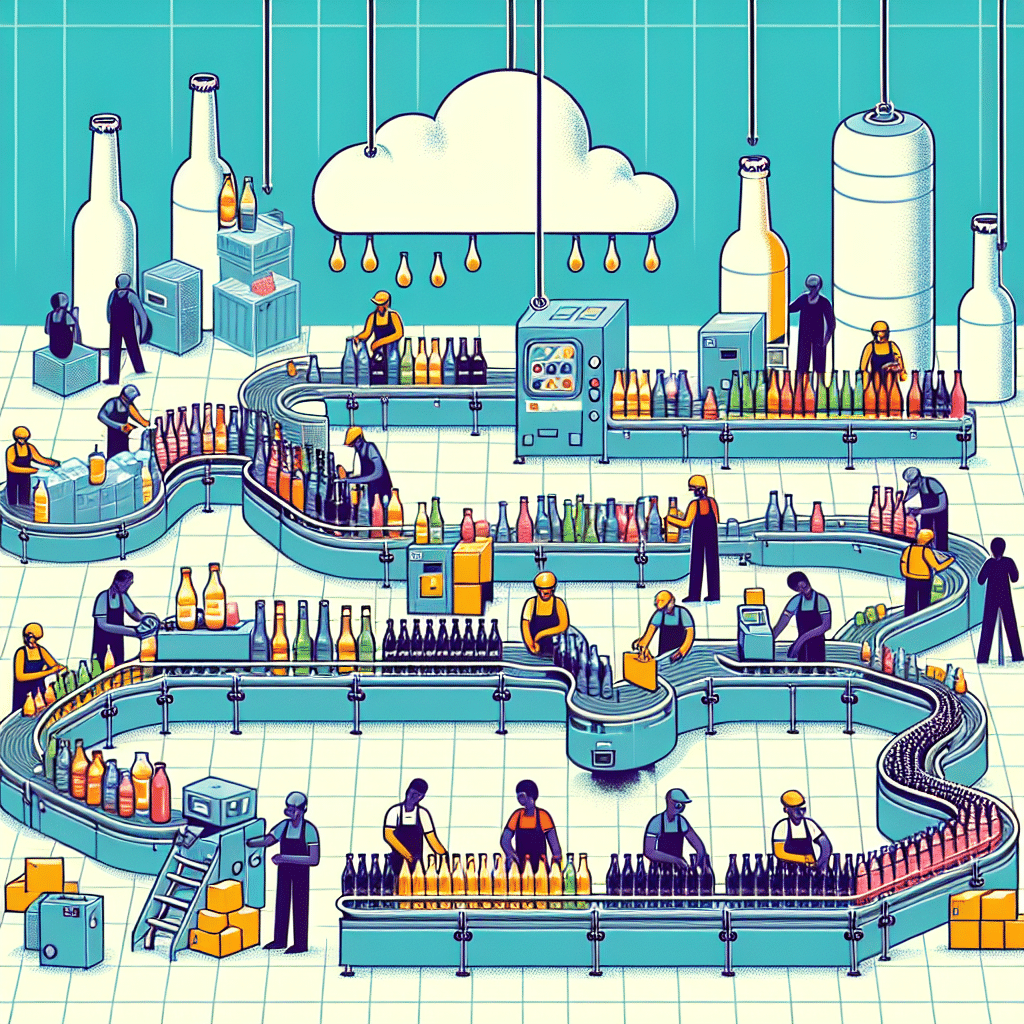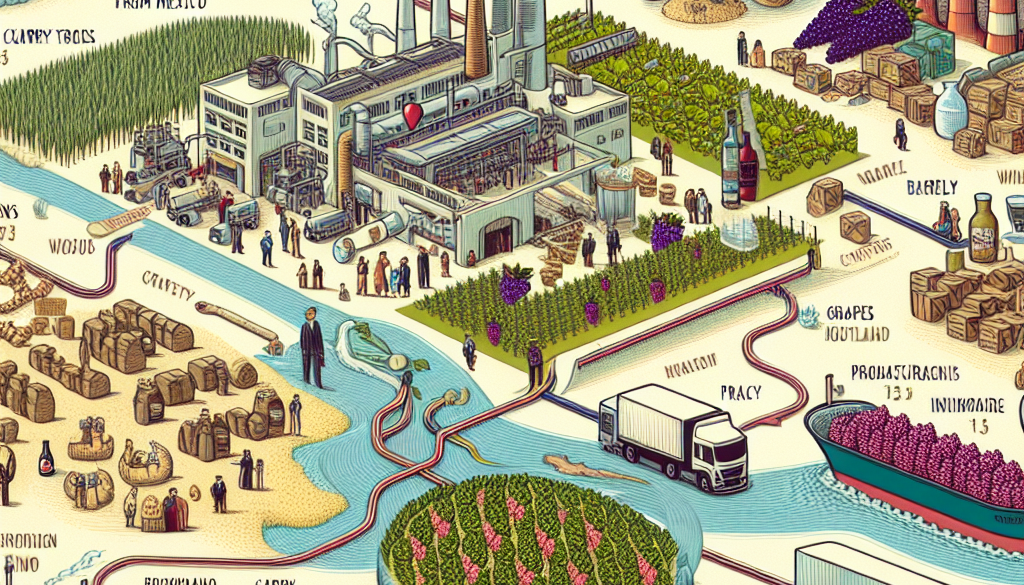Supply Chain Challenges in the Beverage Industry
-
Table of Contents
- Supply Chain Challenges in the Beverage Industry: Navigating Complexities
- Understanding the Beverage Industry Supply Chain
- Major Supply Chain Challenges in the Beverage Industry
- Raw Material Sourcing and Volatility
- Manufacturing and Quality Control
- Regulatory Compliance and Sustainability
- Logistics and Distribution
- Technology Integration and Data Management
- Strategies for Overcoming Supply Chain Challenges
- Conclusion: Ensuring a Resilient Beverage Supply Chain
- ETprotein: Enhancing the Beverage Industry with Quality Protein Products
Supply Chain Challenges in the Beverage Industry: Navigating Complexities

The beverage industry is a dynamic and fast-paced sector that plays a crucial role in the global economy. However, it faces numerous supply chain challenges that can affect everything from production to distribution. In this article, we will explore the various hurdles that beverage companies encounter and how they impact operations. We will also look at how companies can address these issues to ensure a smooth and efficient supply chain.
Understanding the Beverage Industry Supply Chain
The supply chain in the beverage industry is complex, involving multiple steps from raw material sourcing to product delivery. Key components include:
- Raw material procurement
- Manufacturing and processing
- Packaging
- Inventory management
- Distribution and logistics
- Retail and marketing
Each of these stages presents its own set of challenges, which can be exacerbated by external factors such as economic fluctuations, regulatory changes, and environmental concerns.
Major Supply Chain Challenges in the Beverage Industry
Raw Material Sourcing and Volatility
Securing a consistent supply of high-quality raw materials is a significant challenge for beverage companies. Factors such as climate change, political instability, and market volatility can affect the availability and cost of ingredients like coffee beans, cocoa, sugar, and fruit concentrates. For instance, a drought in a major coffee-producing region can drastically reduce yield, leading to a spike in prices and a scramble for alternative sources.
Manufacturing and Quality Control
Ensuring product quality and safety is paramount in the beverage industry. This requires sophisticated manufacturing processes and strict quality control measures. However, maintaining such standards can be difficult, especially when dealing with high volumes and the need for cost efficiency. Any lapse in quality can lead to recalls, brand damage, and legal issues.
Regulatory Compliance and Sustainability
Beverage companies must navigate a complex web of regulations that vary by country and region. These may pertain to health and safety, environmental impact, and labeling requirements. Additionally, there is increasing pressure to adopt sustainable practices, such as reducing water usage and carbon footprint, which can require significant investment and restructuring of existing processes.
Logistics and Distribution
Transporting beverages, especially those that are perishable or require refrigeration, poses logistical challenges. Companies must ensure that products are delivered in a timely manner while maintaining quality. This involves managing a fleet of vehicles, dealing with traffic congestion, and coping with disruptions such as natural disasters or labor strikes.
Technology Integration and Data Management
Advancements in technology offer opportunities for improving supply chain efficiency, but they also present challenges. Integrating new systems can be costly and time-consuming, and there is a need for skilled personnel to manage and analyze the vast amounts of data generated.
Strategies for Overcoming Supply Chain Challenges
To address these challenges, beverage companies can adopt several strategies:
- Developing strong relationships with suppliers to ensure a reliable source of raw materials.
- Investing in advanced manufacturing technologies to improve quality control and efficiency.
- Staying abreast of regulatory changes and proactively working towards sustainability.
- Optimizing logistics through route planning, inventory management, and contingency planning.
- Embracing digital transformation to enhance data management and decision-making.
Conclusion: Ensuring a Resilient Beverage Supply Chain
The beverage industry’s supply chain is fraught with challenges that require careful management and strategic planning. By understanding these challenges and implementing effective solutions, companies can create a resilient supply chain capable of withstanding various disruptions. This not only ensures the smooth operation of the business but also contributes to customer satisfaction and brand loyalty.
ETprotein: Enhancing the Beverage Industry with Quality Protein Products
For beverage companies looking to enhance their product offerings with high-quality protein ingredients, ETprotein is an excellent partner. Their range of organic bulk vegan proteins and L-(+)-Ergothioneine (EGT) products are ideal for creating innovative and health-conscious beverages. With a commitment to non-GMO, allergen-free ingredients, and high purity standards, ETprotein can help beverage manufacturers meet consumer demand for nutritious and sustainable options.
About ETprotein:
ETprotein, a reputable protein and L-(+)-Ergothioneine (EGT) Chinese factory manufacturer and supplier, is renowned for producing, stocking, exporting, and delivering the highest quality organic bulk vegan proteins and L-(+)-Ergothioneine. They include Organic rice protein, clear rice protein, pea protein, clear pea protein, watermelon seed protein, pumpkin seed protein, sunflower seed protein, mung bean protein, peanut protein, and L-(+)-Ergothioneine EGT Pharmaceutical grade, L-(+)-Ergothioneine EGT food grade, L-(+)-Ergothioneine EGT cosmetic grade, L-(+)-Ergothioneine EGT reference grade and L-(+)-Ergothioneine EGT standard. Their offerings, characterized by a neutral taste, non-GMO, allergen-free attributes, with L-(+)-Ergothioneine purity over 98%, 99%, cater to a diverse range of industries. They serve nutraceutical, pharmaceutical, cosmeceutical, veterinary, as well as food and beverage finished product distributors, traders, and manufacturers across Europe, USA, Canada, Australia, Thailand, Japan, Korea, Brazil, and Chile, among others.
ETprotein specialization includes exporting and delivering tailor-made protein powder and finished nutritional supplements. Their extensive product range covers sectors like Food and Beverage, Sports Nutrition, Weight Management, Dietary Supplements, Health and Wellness Products, and Infant Formula, ensuring comprehensive solutions to meet all your protein needs.
As a trusted company by leading global food and beverage brands and Fortune 500 companies, ETprotein reinforces China’s reputation in the global arena. For more information or to sample their products, please contact them and email sales(at)ETprotein.com today.












